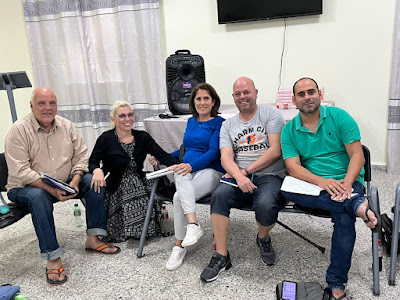Our 2nd and 3rd days included meetings with the leaders of the El Centro Presbytery and the pastors of the local churches.
There are 12 churches and 5 pastors, so every pastor leads more than one church, alternating which church they preach at each Sunday. The towns are roughly 20-30 minutes apart depending on how old/slow the vehicle is that you are traveling in. The congregations range in size, but I believe most are around 30-70 members. Each congregation is very active in their communities with feeding programs, small pharmacy distribution centers, children's ministries, community gardens and more.
These congregations are supported by sister churches in the US, some of whom have been partners for many years. Everyone on the trip, except me, had been to Cuba multiple times and knew the pastors and other leaders. (As people were catching up, it became clear that there was a lot of turn over in leadership over time. We heard over and over again - so-and-so had left and was now in the US. I didn't ask if they were legal immigrants or not. I'm not up to date on US immigration law with regard to Cuba and since I didn't have internet connectivity, I couldn't google that and the million other questions that I had).
US churches contribute financially as well as bringing in much needed medicines and other goods with each visit, but the most important part of the partnerships is relational. We heard and experienced this throughout the trip. One of the leaders was very clear that partners were equals and that we should not think less of them because of their economic situation. Throughout the trip my regard continued to increase as we learned what they managed to accomplish with so few resources. They had a lot of plans to improve facilities, services to people in their community, and different enterprises that would allow them to generate more revenue and be self sustaining (solar panels, buses to provide transport between towns, etc).
Before we dove in to updates on the congregations and the financing for the Presbytery, one of the pastors offered an extended devotional on Jeremiah 29. I don't know what I was expecting, but I was surprised. His remarks were carefully prepared and deeply reflective. I think I had expected a little less depth due to language barriers, but we had a trained translator who was very good at remembering extended chunks of conversation and translating it carefully between English and Spanish. He took great care to capture the specific turn of phrase that people were using so that meaning was not lost in the process. All of the pastors in the region had attended the Cuban seminary and were quite educated. (I was told that the Cuban government highly values education and that the schools are quite good. In fact, one Cuban 'export' are their medical doctors who practice outside of the country and send back remittances from the salaries they earn abroad.) I had to laugh when the pastor doing the devotional mentioned exegesis and hermeneutics (hermeneutico). Presbyterians are Presbyterians everywhere.
At the end of the day, the group ended up playing some 'ice breaker' games (this might have been better on the first night so we knew each other better, but it was still fun.). We played a game where we had to vote yes/no on whether as statement about someone was true. "Carolyn has a tattoo that you can't easily see. Si o no?" Almost everyone got that one wrong - I do not have a tattoo anywhere. lol.









No comments:
Post a Comment